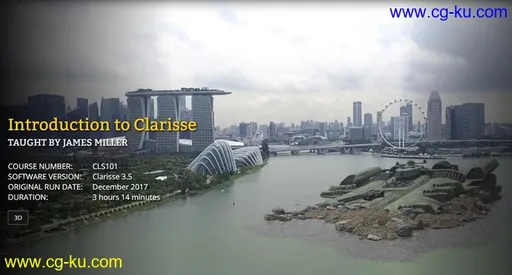Duration 3h 14 Project Files Included MP4
Title: FXPHD – CLS101-Introduction to Clarisse
Info:
This course is aimed at giving you a thorough introduction of Clarisse, from the basics of how to use the software to render an image, through to creating bespoke AVO’s using the recently implemented light path expressions, as well as touching on many other features new in 3.5.
James Miller is a Generalist Digital Artist and has worked for companies such as Double Negative and Industrial Light and Magic, on blockbusters such as Star Wars, James Bond, Hunger Games and the Marvel films. He is currently based in San Francisco, California, and is one of the original Clarisse users, having been one of the artists to first use the program professionally. He continues to be part of the active professional user group, helping feedback on the continued development of the program.
Participants on this course is not expected to have any prior knowledge of Clarisse, but will find it helpful to be comfortable with the basics of 3d, such as asset types, UDIM workflows, planar projections, as well as the basics of scattering. There will be some light use of expressions, but no previous knowledge is required for this.
CLASS 1: INTRODUCTION
An introduction to the course. An overview of the interface, navigation within Clarisse, project structure, setting up our scene and how to import different asset types.
CLASS 2: SETTING UP THE PROJECT
Setting our project up from scratch to render an image, and organizing assets to render. Camera and context navigation, as well is looking and using combiners and groups for the first time.
CLASS 3: BUILDING AND WIRING MATERIALS
Building and wiring materials within Clarisse, on our hero, UV’d asset. Assigning materials using the material linker, as well as setting up basic look development parameters and lighting. We will also be looking at how to use bump and normal passes, as well the IOR options used in physically based rendering.
CLASS 4: TRIPLANAR MATERIAL AND MATERIAL EDITOR
Creating a triplanar material, and using the material editor. Also looking at using AOV’s to help us build and adjust our materials, as well as 3d displacement and the options available.
CLASS 5: POINT CLOUD AND SCATTER
Using the point cloud and scatter to create our rock distribution, as well as decimating that point cloud using the occlusion between the water and the rock surface. Creating water ripples using noise and animating the noise map.
CLASS 6: PLATES AND ASSETS
Importing our plate and adjusting our assets in 3d space to fit the composition. A brief look into colour space, using matte objects and lighting.
CLASS 7: CRYPTOMATTES
Applying cryptomattes to our AOV output, enabling motion blur, and creating utility passes like P-world, as well as material overrides on a layer level. Using light path expressions to create AOV’s to allow us to relight in nuke. Exploring shading layers as an alternative to the material linker. Finally creating layers and preparing to render.
CLASS 8: RENDERING
Final preparation for rendering, looking at material, light and raytrace samples, as well as when to use each one. Setting output paths, frame ranges and rendering.
CLASS 9: COMPOSITING

发布日期: 2020-05-11